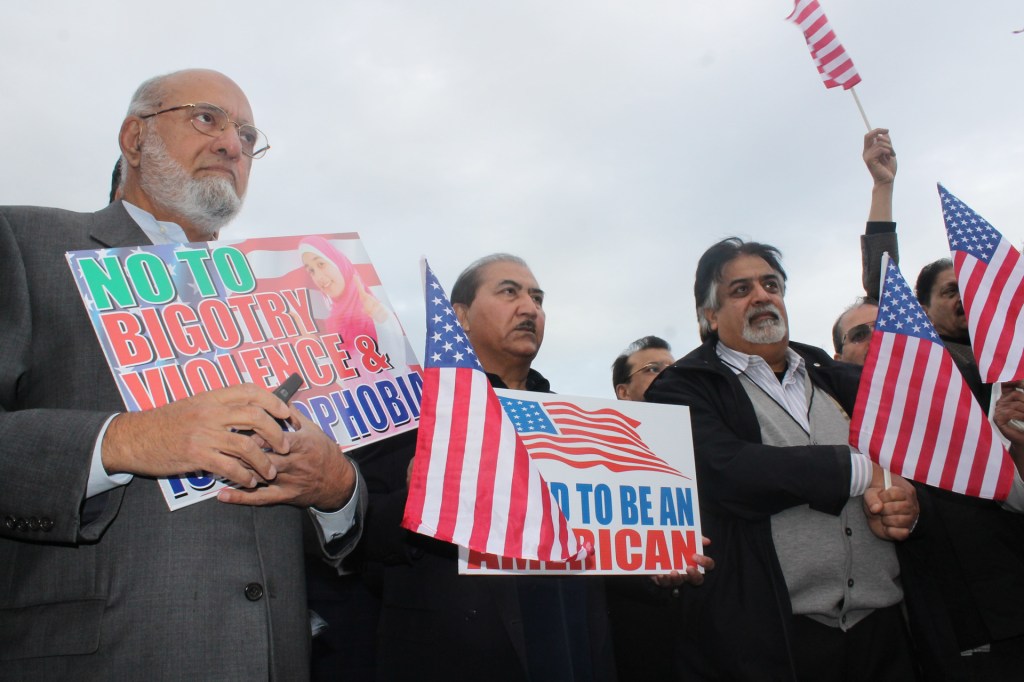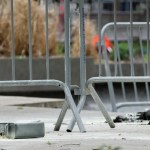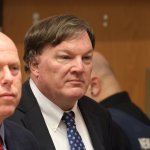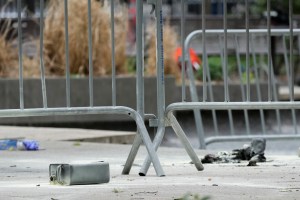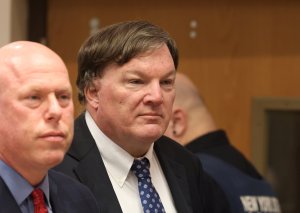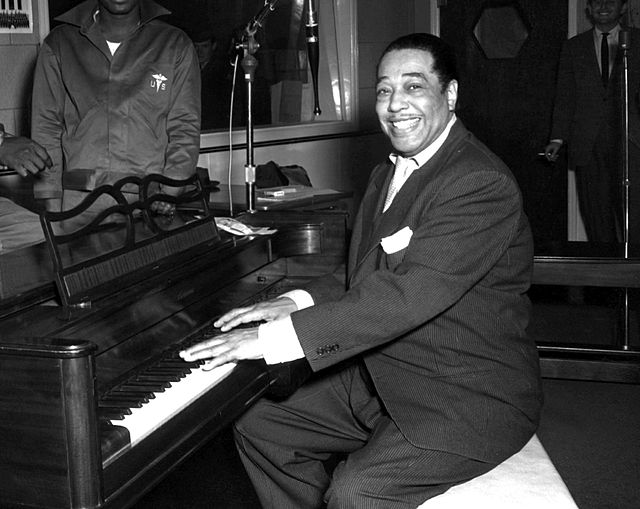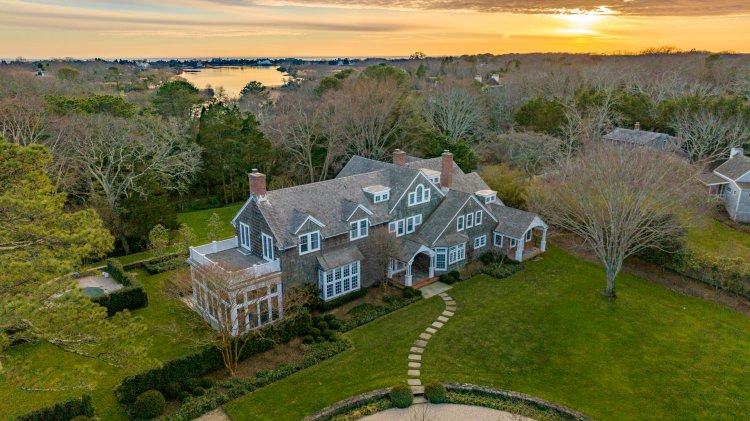It was 2 p.m. on a recent Friday when the cold, pattering rain finally ceased, just in time for dozens of American flag-waving Muslim Americans to stream out of Masjid Noor following a passionate sermon attended by Muslims and non-Muslims alike.
As dozens of congregants exited the Huntington mosque, they turned toward a busy road and made the small climb up the mosque’s rain-soaked parking lot. There was a determination in their strides that belied the anxiousness enveloping their much-maligned community.
It’s not unusual to see dozens of people sharing laughs and congregating near a mosque on the busiest prayer day of the week. But this particular service boasted an impressive showing of around 100 congregants kneeling for prayer, while about a dozen dignitaries—Suffolk County Executive Steve Bellone, New York State and local lawmakers, interfaith leaders and police brass—respectfully watched the prayer service from two rows of seats in the rear of the mosque.
Leaders of Masjid Noor, who were motivated by recent high-profile attacks and virulent anti-Islam comments emanating from the Republican presidential candidates, organized the interfaith rally they tellingly called: “Proud to be an American.”
Standing under cloudy gray skies, a bearded man proudly waving an American flag bellowed, “God bless America!”
A young man in a wool Ohio State hat held a sign that declared:
“Whoever kills an innocent life, it is as if he’s killed all of mankind.”
An older Pakistani man who proclaimed his love for not only America but his adopted hometown of Huntington was toting a sign featuring a girl wearing a pink Hijab with Old Glory in the background that announced:
“No to bigotry, violence & Islamophobia.”
The huddled masses stood with their backs to the road and trained their eyes on the mosque as speaker after speaker passionately stood up for their beliefs.
“Donald Trump,” Dr. Hafiz Ur Rahman said, “when I came here from Africa, I burnt my boat, so I am not going back. I am here to stay.”
Rahman’s unexpected quip prompted chuckles from the close to 100 people rallying in support of their religion. Indeed, Muslims can tell jokes, too.
Trump’s increasingly inflammatory remarks may have provided the incentive for the rally, but the billionaire real estate magnate’s name was hardly mentioned. Instead, non-Muslim speakers pledged their support to this beleaguered community while Muslim leaders sought to reaffirm their allegiance to a republic they adore because of the bountiful opportunities it offers.
“There’s no such thing as how an American looks; what you see right here is America,” Dr. Mamoon Iqbal, a board member of Masjid Noor, yelled into the microphone. “Everyone who came into this country came from somewhere else. We are the immigrant population: We have first generation here, we have second generation here; this is America!”
Suffolk County Executive Steve Bellone agreed.
“This is not a Republican issue or a Democratic issue, this is an American issue,” said Bellone, a Democrat, to applause. “This is about what we stand for as a country, and we must always be cognizant of the fact that there will be—in every generation, in every time—people who will stand up and who will attempt to undermine what this country represents, and that is that all people have the right and the ability to practice their faith and their religion. That is what this country is founded upon.”
Once again, Long Island Muslims were compelled to let their voices be heard in unison after the recent terror attacks in Southern California and Paris. Here they were again answering for the atrocities perpetrated by a small band of bloodthirsty, apocalyptic terrorists perverting a religion worshiped by 1.6 billion people worldwide. A religion that President George W. Bush said, six days after the Sept. 11, 2001 attacks, represents “peace.”
Yet suspicion abounds unabated despite the persistent pleas for tolerance and understanding.
After each deadly strike, a common refrain seems to ricochet through American mass media: that Muslims don’t condemn terror. Yet Muslims insist they do condemn these terrible atrocities but the coverage is woefully inadequate. At last Friday’s rally in Huntington, there were no TV cameras in sight to broadcast the emphatic, heartfelt, broad-based rebuke of terror, rampant Islamophobia, violence and bigotry.
An organizer said invitations were sent to multiple news organizations in the area, but the Press appeared to be the only outlet reporting on the event. It was as if these leaders were shouting into a void that keeps expanding after each terror attack.
Since media coverage was virtually non-existent, here’s what Long Islanders didn’t get a chance to see in the comfort of their own homes: Muslim Americans proudly displaying their affection for a country that many of them were not born into but said they cherish once they came here. The image of flag-waving Muslim Americans proudly professing their devotion to the United States directly contradicts the mainstream perception of Muslims.
The rally was preceded by a powerful sermon that gave non-Muslims a glimpse into what the religion dictates.
“None of you can complete your faith until you provide for your neighbors what you have for yourself,” shouted Dr. Mufti Mughal.
“A person has no faith who goes to sleep while his stomach is filled while his neighbor does not have anything to eat,” he added. “This person cannot be a believer.”
The spread of hateful rhetoric has caused deep angst in the community. Muslim leaders in both Nassau and Suffolk counties have told similar stories of congregants so fearful of being admonished for their faith that they are hesitant to even go out in public.
“Of course, they’re afraid to go out! I’m afraid to go out,” Nayyar Imam, Suffolk County police’s first-ever Muslim chaplain, told the Press. “I used to go out, like 3 o’clock or 4 o’clock, to the mosque, but now I don’t go before 6 [a.m.]. I go there late because there are crazy people out there, and you should not be alone, especially at night in dark places.”
That fear is widespread.
On LI, hostility toward Muslims has even seeped into a school in Suffolk, where a student reportedly called a 7-year-old classmate who wears a Hijab a “terrorist.” Just as disturbing, Suffolk police are investigating a repulsive competition instigated on Facebook recruiting people to tear Hijabs off women’s heads, officials said.
All these social anxieties have come to a head as Republican presidential candidates have successfully channeled fear of “The Other” to win support. The most prolific anti-immigrant candidate is Trump, who recently proposed to ban all Muslims from entering the US, the latest in an ever-growing list of what many immigrants see as objectionable policy recommendations espoused by the GOP frontrunner, whom they consider to be a xenophobic demagogue pandering for votes.
Since the attacks in San Bernardino and Paris, Muslim Americans and other faith leaders on the Island have been working behind the scenes to improve relations inside their respective communities. They’ve met at churches and mosques and discussed tangible ways to retake the narrative about Islam from the grasp of terrorists. They hope their outreach efforts will give Americans who have had little or no interaction with Muslims a truer sense of what the religion represents.
Muslims in both counties have also met with police officials and discussed various initiatives they hope to implement in the near future. One of the first requests from Muslim leaders, that police bolster patrols around mosques during heightened prayer times, has already been implemented. Other mechanisms intended to improve cooperation between Muslims and law enforcement are in the works.
Much of what Muslims are doing flies under the radar. They are being proactive, leaders in the community say. They are reaching out to other faiths. Yet stats show that the majority of Americans—62 percent—don’t know any Muslims, and most of what the American public hears or sees about Muslims are images of masked murderers justifying mass bloodletting by invoking Islam. Leaders on Long Island agreed that much more remains to be done to create better understanding between people of different faiths.
“I ask all our community members to please come together and condemn all sorts of hate, of violence, of bigotry, of Islamophobia, of anti-Semitism; any kind of thing that makes differentiation between us, we condemn it wholeheartedly,” said Iqbal to the crowd at Friday’s rally.
”This is why we are here on this cold day in the middle of our work day,” he continued. “We’re here to stand together as a community to show the people who have hate for us, that this is what Islam means and this is what being an American means.”
American Muslims know that some of the responsibility falls on them to change the discourse. And they’re eager to get their message out because they realize their religion is once again unfairly under attack.

STANDING UP TO HATE
Habeeb Ahmed was standing in a bare, sheet-rocked room inside the Islamic Center of Long Island in Westbury, which will eventually serve as a classroom for young Muslims when the mosque’s $4 million expansion is finally complete. He’s expected to take over as ICLI president in three years.
Ahmed had been busy all day. The San Bernardino attacks had happened a week-and-a-half before and Trump had just proposed to ban all Muslims from coming into the country. News crews had been at the mosque to discuss the attacks, which as a Muslim, he had to answer for.
“We are at the bottom of the barrel these days in the community,” Ahmed lamented.
Like many leaders at ICLI, Ahmed, who has spent three-quarters of his life in America, is an eternal optimist. Despite following a religion hijacked by terrorists and criticized for ostensibly being used as the vehicle to carry out their attacks, Ahmed and others insist things will get better, that everything they’ve worked toward—peace, harmony and mutual respect—will one day come to fruition.
Just before Friday’s services, two women from a nearby Unitarian church had visited Ahmed because they wanted to stand in solidarity with the Muslim community.
“It is very powerful,” a grateful Ahmed told the Press. “It was so kind. It is very powerful. Believe me, I thanked them 10 times. They looked at me like this guy is losing his marbles.”
Ahmed laughed at the way he had responded to their entreaty.
“Really,” he continued, “to me that was a million-dollar gesture.” He recalled telling them, “You have your own life to live, but you said, ‘Let me go and spend some time with these people.’”
After 13 people were killed in Southern California earlier this month, interfaith leaders suggested that members of the ICLI visit a local church to meet with congregants there and sit down for coffee. Interfaith leaders got the ball rolling, and within days Ahmed made plans to visit Parkway Community Church in Hicksville.
The pastor at Parkway Community Church is Rev. Harold Lay. He has been involved in interfaith work since 9/11, when he was living in New Jersey. But his interaction with Muslims goes back further than that. When he was a student, Lay took a trip to Beirut, Lebanon, where he got to speak to Lebanese people and learn about their culture. (Beirut was the site of a suicide blast that killed 40 people one day before the Paris attacks on Nov. 13 that killed 130 people and injured scores more.)
Lay told the Press his congregation had welcomed 15 members of the ICLI for Sunday services.
“Our people were pleasantly surprised,” he said on a recent Thursday morning inside the church.
It’s small exchanges of greetings like these that can exact change, he said.
“The interaction is very important because it breaks down the stereotypes,” Lay told the Press. “When the media says a ‘Muslim did this,’ you have to ask, ‘Well, would all Muslims do this?’ ‘A Christian did this.’ ‘Would all Christians do this?’
“As you know more people of another faith, you would say, ‘Well, that person wouldn’t do that,’” he continued. “So the label has less significance, and we begin to see that the actions of people of all religions are unique to the person choosing to act and not specifically to the religion.”
Rev. Dwight Lee Wolter echoes the sentiment. He is very cognizant of how fear can flip a community upside down. Wolter is the pastor of The Congregational Church of Patchogue, which served as a refuge for local residents shaken up after the hate crime attack that killed 37-year-old Ecuadorean immigrant Marcelo Lucero in November 2008. Seven teens were convicted in the case, which received national attention and highlighted deep fissures in the community over race relations.
“When this issue began to rear its ugly head, it began to feel very viscerally like I was getting déjà vu,” Wolter told the Press.
Anti-Muslim sentiment in 2015 has reminded Wolter of Patchogue in 2008.
“I’m not going to sit around and let this thing happen again,” he said he thought to himself. So, instead of just preaching about acceptance, Wolter decided to act. Within days of the San Bernardino massacre, he created a movement called “Adopt-a-Mosque” with a goal of inspiring people of different faiths to mingle together.
“In the past 15 years of interfaith initiatives, I have learned that the vast majority of Muslim-Americans are peaceful, purposeful and patriotic,” Wolter wrote on the Adopt-a-Mosque program’s website. “It is unfortunate that the entirety of Islam is being held accountable for the heinous acts of a few fanatics claiming to be devout Muslims. Stories of successful relations between Muslims and non-Muslims are routinely ignored by the media whose commonly known industry mantra is, ‘If it bleeds, it leads.’”
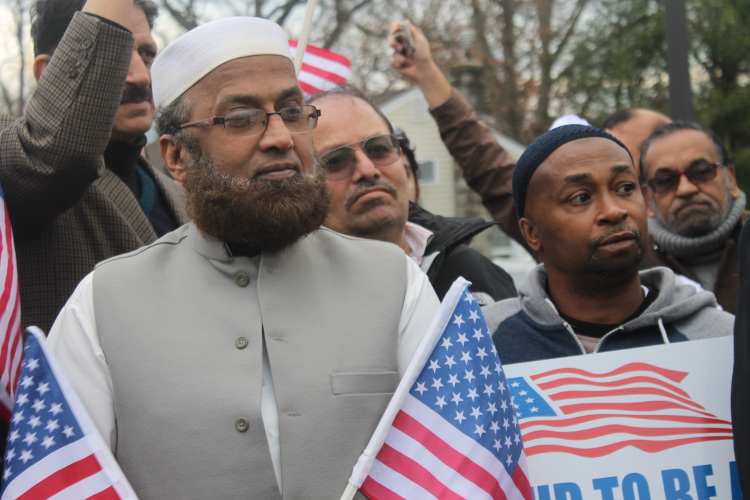
While initiatives like Adopt-a-Mosque have a chance of sparking productive conversations about Islamophobia, Wolter hopes many mosques and Islamic groups will reach out to churches and synagogues in their communities.
“I really believe mosques and Islamic civic associations need to do–and this is a generalization–a better job of getting out of the mosque, getting out of the Islamic associations, and into the churches and into the fellowships, synagogues,” he said.
“I know it’s not easy when you’re a Muslim to knock on a door…but I think this is what it takes,” he added.
It’s not only Muslims and Christians working hard to debunk dangerous myths about Muslim Americans, who make up less than 1 percent of the entire US population.
At the Midway Jewish Center in Syosset, Rabbi Perry Raphael Rank has penned an online petition called “Clergy & Religious Organizations Against Terror.” In it, he reminds people that faiths are meant to promote peace and mutual understanding, while also noting that terrorists who use religion as the basis for bloodshed are “victims of insidious deception.”
Rabbi Rank acknowledged that there’s a real fear among Americans due to these high-profile attacks. It’s that dread that presidential candidates have used to promote policies that experts say plays into the hands of terror groups like the so-called Islamic State who can then use anti-Islam comments as propaganda to brainwash potential recruits under the guise that a Western war is being waged against Islam.
“That fear is not to be minimized,” Rabbi Rank told the Press, “but at the same time we have to make sure that people do not demonize other groups at the expense of those good people who are trying to lead lives of faith and lives of integrity.
“Generalizations are odious,” he added, “and when an entire group is demonized, we end up hurting good people, and we end up hurting ourselves as well.”
NOT GOING ANYWHERE
The attacks in Paris and San Bernardino have incited a level of Islamophobia that many Muslims say they haven’t felt since 9/11.
Across America Muslims have faced a backlash walking down the street, inside shops they own, at town hall meetings and in classrooms. Mosques, the symbol of the Islamic faith, have been defaced, burned and vandalized. Korans have also been defiled with feces and found on the doorsteps of mosques with bullet holes.
In Meriden, Conn. a man was arrested for shooting at the mosque next door to his home. In Astoria, Queens, a Muslim store owner was beaten so badly he thought he was going to be killed. A woman in Cleveland was almost run over for wearing a Hijab.
Similar incidents have occurred all over the country. Attacks like this have happened before, but never have mainstream presidential candidates been so willing to stoke that fear in order to win votes.
The response from Muslims is not to fight back, but to engage with their community. In Nassau and Suffolk counties, Muslim leaders have met with police brass to express their concerns and consider ways to improve communication.
On a recent Thursday in Yaphank, Muslim leaders were invited to Suffolk police headquarters to meet with newly-installed deputy commissioner Tim Sini, who is the county executive’s pick to take over as commissioner, and his own deputies.
“This is a particularly appropriate time to call this meeting in light of some of the national rhetoric about Muslims in America,” Sini told reporters at a press conference that day.
Among the ideas they had discussed, Sini said they talked about creating a private messaging service so Suffolk police and the Muslim community could seamlessly share messages. Officers of the police department may soon be visiting mosques to give members of the community several tips to prevent them from being victimized in public. The department is also considering establishing a liaison from the Hate Crimes Unit who would act as a direct point of contact for Muslim residents.
“What has happened, the rhetoric [is] much higher than after 9/11,” Dr. Hafiz Ur Rahman told reporters. “It has definitely frightened the community. Children are afraid to go out. Women are afraid to go out. Even the men.”
The rhetoric is so vitriolic that even young students seem to have been caught up in the wave of hate.
Dr. Mohamed Sameen, who was at the press conference, said his 7-year-old daughter became a victim when a classmate recently called her a “terrorist.” Sameen has two children, and his daughter wears a Hijab to school.
“She feels threatened,” he said. He and the police declined to identify the school.
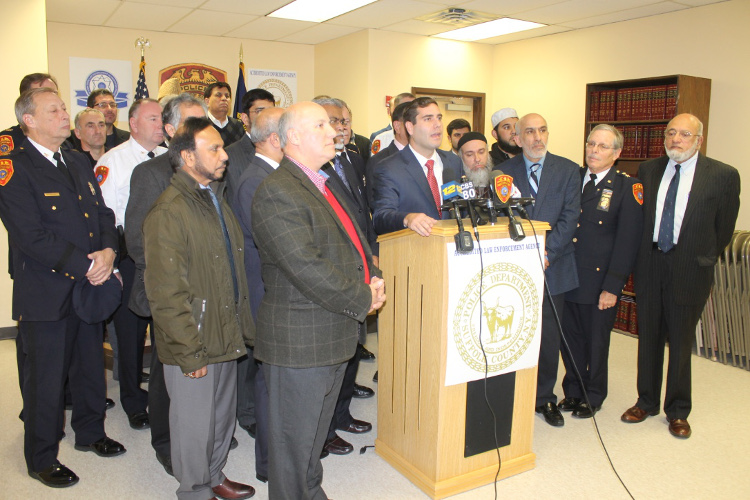
More disturbingly, Muslim-bashing is even being regarded as a sport.
Sameen noted that he’s seen some people on LI using a Facebook page to invite others to rip Hijabs off of women’s heads. Sini confirmed that the office of the chief of department is investigating the case. He forcefully condemned these attacks.
“The Suffolk County Police Department will not tolerate any sort of criminal activity toward any cultural group, any religious group in Suffolk County, and that includes the Muslim community,” he said.
“We will respond effectively and we will respond with vigor,” he warned.
Similar steps are being taken in Nassau to protect Muslim citizens.
Acting Nassau County Commissioner Thomas Krumpter told the Press that his department held a meeting with leaders from the county’s mosques several weeks ago to discuss concerns that have been raised.
“We have a longstanding relationship with the Muslim community and the Muslim leadership in Nassau County,” Krumpter said.
The commissioner noted that he intends to visit mosques across the county over the next couple of months. Some recommendations from Muslim leaders, he said, are already being implemented.
“I think most people in Nassau County realize that Muslims are a good group of people, and there’s some people who have twisted ideology out there,” he told the Press.
The acting commissioner pointed out that the Muslims he met with had condemned those atrocities committed in the name of their religion.
Muslim Americans can only hope that their message of tolerance will take hold as the election year dawns.
“It’s very important not to judge a religion of over a billion by select thousands,” Yehia Sewid, 19, of Dix Hills, told the Press during the spirited rally in Huntington.
“A lot of people think that innocent Muslim Americans aren’t coming out and supporting the American cause,” he added. “It’s very important for us to come out in solidarity with innocent lives that are killed, regardless of faith, regardless of religion, color, creed. It’s very important to come out and display the message that we are not chaotic people. We’re not barbaric. We’re not who these groups of people display our religion to be.”
Muslims are speaking out. But who else is listening?



